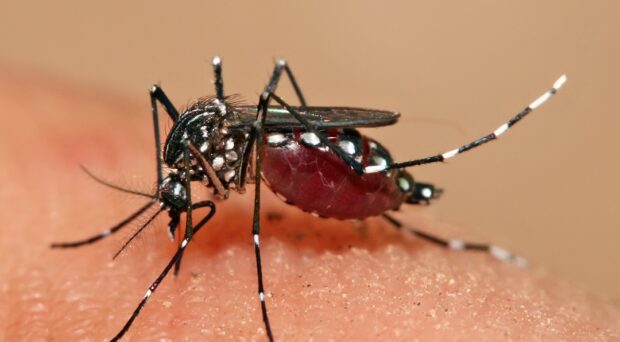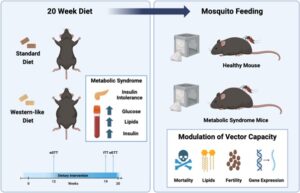
As populations in low and middle-income countries become wealthier, a transition to a Western diet is occurring. This is resulting in a growing incidence of Metabolic syndrome. Caused by the consumption of the high fat and high sugar content of processed foods, metabolic syndrome presents as changes in blood chemistry. These include the levels of lipids, glucose and inflammatory cytokines, and can lead to the development of cardiovascular disease and type II diabetes.
Human blood is the food source of many animals, including mosquitoes. Do these changes in blood composition affect them?
Feeding on people with different blood plasma components
Several studies have demonstrated that individual blood plasma components can alter the life history traits and vector competence of mosquitoes. These investigations have, however, looked at the effect of individual components rather than the multiple changes that occur in metabolic syndrome. A team from Universidade Federal do Rio de Janeiro, Brazil, have created a model for metabolic syndrome to remedy this omission.
Feeding on blood altered by features of metabolic syndrome
Using their colony of Aedes aegypti, the yellow fever mosquito, the researchers investigated the effect of a blood meal from mice that had had a diet that simulated the symptoms of metabolic syndrome. This was done by feeding one group of mice on a high fat, high sugar diet (HFHS), and another on their normal chow diet, for 20 weeks. The weight and glucose and insulin tolerance of the mice was monitored during this 20-week period. Mice fed the HFHS diet exhibited increased weight gain, glucose and insulin intolerance and had increased glucose, insulin and cholesterol levels and markers of liver damage when compared with the control mice.
Mosquito longevity and egg production
Mosquitoes were allowed to feed on one or other group of mice or were fed only sugar as a further control.

Their longevity was measured for 30 days, and survival curves constructed. Damp filter paper was provided for mosquito egg laying and the mass of eggs laid was assessed after the paper had dried, and normalised for the number of insects in the cage.
Survival rates were highest in the sugar-fed group. Mosquitoes fed on the HFHS diet were impacted most. There were significantly more dead mosquitoes at the end of the study period in this group than the other two groups. In contrast, reproductive output, in terms of egg mass produced, was highest in the HFHS-fed group. Because of the experimental design, no account was taken of egg size, so increased mass could have been the result of fewer, but larger eggs. In addition, egg hatch rate was not assessed so we cannot be certain that feeding on the HFHS diet really would result in an increase in the number of mosquitoes in the next generation.
Batches of mosquitoes were used to analyse the fat content of their ovaries and body wall, 1-4 days post blood feeding, by measuring the triacylglycerol content. An HFHS diet resulted in an increase in the fat body on day 2 post feeding and in the ovaries on day 3, indicating a change in nutrient allocation in favour of the ovaries.
Gene expression
The researchers also monitored any alteration in the gene expression profile of nutrient sensing and physiological and metabolic markers that resulted from feeding on HFHS blood. They found that the gene for forkhead box O, a negative regulator of the insulin pathway, was downregulated compared with that in mosquitoes fed on the control group on day 4 post-blood feeding. This may contribute to the reduction in longevity associated with feeding on blood from HFHS-fed mice as an increased insulin signalling pathway is known to decrease mosquito longevity.
Nutrient signalling pathways were affected, as seen by an early upregulation of the epidermal growth factor receptor ligands Keren and Vein (associated with nutrient allocation and egg production), as well as an early increase in the expression of fatty acid synthase and lipid storage protein 2.
Overall, the results indicated that feeding on HFHS blood impacted mosquito lipid allocation and metabolism in a manner that may have resulted in a trade-off between longevity and egg production, with the former decreasing and the latter increasing.
Vectorial capacity
Although not assessed directly, the authors speculate that feeding on people with metabolic syndrome may alter the vectorial capacity of Aedes mosquitoes (carriers of several arboviruses, including dengue) because they identified altered expression of markers that are associated with mosquito immunity and vector competence. Furthermore, reduced lifespan would decrease the time available for pathogen transmission, whilst increased egg production could result in larger populations of the vector.
Clearly these interesting findings need to be extended to fully understand the interplay between components of the blood meal and mosquito biology.

Comments